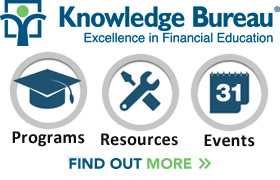
The UHT May Be Cancelled, But Vacancy Taxes Remain
As tax professionals, you are keenly aware of the constant changes our federal government makes to the Income Tax Act. Adjustments are made, and you must adapt. Not often, though, is a tax eliminated altogether. But in the case of the Underused Housing Tax (UHT), that is exactly what has happened – it was cancelled in the federal budget of November 4, 2025, but Canada’s underused housing taxes have not been eliminated. Here’s what you need to know for tax season 2026.Introducting a New Diploma Program
 Knowledge Bureau is pleased to introduce a new Diploma in Advanced Family Tax Compliance. The program provides critical technical studies for professional tax accounting and financial advisors whose clients are facing increasing tax audit risk with recent changes for capital gains dispositions, rental property ownership and family business succession.
Knowledge Bureau is pleased to introduce a new Diploma in Advanced Family Tax Compliance. The program provides critical technical studies for professional tax accounting and financial advisors whose clients are facing increasing tax audit risk with recent changes for capital gains dispositions, rental property ownership and family business succession.
Tax Season 2025: Filers of 6 or More Returns Must EFILE
 Here’s a dark horse for those who NETFILE six or more T1 returns for friends and family. Starting in January 2024, it became mandatory for you to register as a tax preparer for the purposes of EFILE if you accept payment for those returns. Penalties are charged if you don’t comply and even if you want to, you may not pass CRA’s suitability tests.
Here’s a dark horse for those who NETFILE six or more T1 returns for friends and family. Starting in January 2024, it became mandatory for you to register as a tax preparer for the purposes of EFILE if you accept payment for those returns. Penalties are charged if you don’t comply and even if you want to, you may not pass CRA’s suitability tests.
CRA December Shutdown Alert
 CRA plans a system shutdown early this year in December 2024 and could have far reaching repercussions for professional tax advisors and their business owner clients. For example, businesses to electronically file information slips prior to December 2024, and this now includes the requirement that businesses filing 6 or more information returns must do so electronically to avoid filing penalties.
CRA plans a system shutdown early this year in December 2024 and could have far reaching repercussions for professional tax advisors and their business owner clients. For example, businesses to electronically file information slips prior to December 2024, and this now includes the requirement that businesses filing 6 or more information returns must do so electronically to avoid filing penalties.




